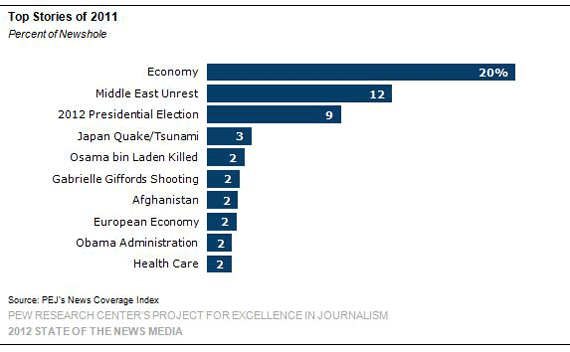Friday File: Farewell to Iowa
December 30, 2011 3:06 pm (EST)
- Post
- Blog posts represent the views of CFR fellows and staff and not those of CFR, which takes no institutional positions.
More on:

Above the Fold. As the Roy Schneider character says at the start of All That Jazz, “Showtime!” After months of speeches, innumerable cable news interviews, hundreds of polls, a dizzying array of attack ads, and more than a dozen debates, we will finally learn what voters think when Iowan Republicans caucus next Tuesday night. (Who thought it was a good idea to schedule the caucus opposite the start of the All State Sugar Bowl? Thank goodness the Iowa Hawkeyes are playing in the Insight Bowl tonight. Otherwise, no one would show up for the caucuses.) If Mitt Romney wins big, the race will likely be over before it has really begun. He is a heavy favorite to win New Hampshire, and momentum builds on itself. But if Romney only ekes out a victory or finishes behind Ron Paul, something that the polls suggest is possible if not likely, the race could drag on for a while. The GOP has taken a page out of the Democratic playbook this year and allowed states to drop winner-takes-all rules and instead award delegates in proportion to the votes each candidates win. So struggling candidates could stay in the race longer. Whatever the results of next Tuesday night’s vote, one thing know for certain is that there will be a spate of stories and blog posts over the next month lamenting that a small, largely rural state that is 95 percent white (actually, 91.3 percent) has such an outsize impact on our presidential selection. The merits of that argument can wait for another time. For now I have to confess that I will miss all the attention being paid to Iowa. I spent eleven wonderful years there, so it’s a trip down memory lane to see places like Ankeney, Pella, Graettinger, Council Bluffs, and Waterloo in the news. Thank you Iowans for enduring more campaign ads and robo calls than any state should have to bear. And don’t worry. Despite all the kvetching about the cold and the corn, the candidates (and the journalists) will be back in 2015, if not sooner.
CFR Event of the Week. CFR has (quite sensibly) been on a holiday schedule this week, which means no events. So I dug into the archives to come up with one of my favorite CFR events of 2011, a visit from Gen. Stanley McChrystal, U.S. Army (Ret.) back in October. He sat down with legendary news anchor Tom Brokaw to discuss where things stood in Afghanistan ten years after the war began. McChrystal noted that the United States continues to face difficulties in creating a stable and legitimate Afghan government, and he said that “we still don’t know enough” about Afghan culture and history. The problems the general cites haven’t gone away in the past three months, and they are likely to bedevil U.S. efforts going forward to draw down its forces in Afghanistan while creating a stable government. You can download the audio of the talk to listen at the gym, watch the video below, or read the transcript.
Click here to view this video on YouTube.
Read of the Week. 2011 may be best remembered as the year in which all the world got to see how dysfunctional Washington politics has become. Tea Party Republicans bitterly resisted the move to raise the national debt ceiling even though they themselves voted for a budget plan that would have run deficits for years to come. The outcome of the game of chicken between Democrats and Republicans was a few modest spending cuts and a deal to dump the problem in the lap of a congressional super committee. The result was the first-ever downgrade of the U.S. credit rating and three months of news stories asking if the super committee could save the day. It didn’t. Given that U.S. economic growth isn’t emulating China’s, that means, as Stacy Kaper and Catherine Hollander point out in the National Journal, that we could witness another debt ceiling debate next fall as we head into the election season. Ugh.
Blog Post of the Week. Last week Stephen Walt blasted Matt Kroenig’s call in the most recent edition of Foreign Affairs for the United States to attack Iran. This week Steve offered Matt a chance to respond, and he did. Of course, when you post a rebuttal on someone else’s blog you are inviting them to return fire, which Steve did. You can be the judge of who has the better of the argument. Either way, I will put aside my general aversion to making predictions to predict that we will all be hearing a lot about the Iran issue—and the arguments and counterarguments that Steve and Matt make—in 2012.
Poll Question of the Week. Are you optimistic about 2012? If so, you are in the majority. An Associated Press-GFK poll done in mid-December found that 62 percent of Americans are optimistic about what 2012 will bring for the country, while 36 percent are pessimistic. Is this a good omen? Perhaps not. A year ago 58 percent of Americans thought that 2011 would be better than 2010. Yet, as 2011 wraps up, 54 percent of Americans think that 2011 was a bad year overall for the country.
Chart of the Week. So what was the top story in the American news media in 2011? No surprise here: the faltering U.S. economy. What may be surprising is that the Middle East uprisings come in second. (I thought it would have been Kim Kardashian’s wedding-honeymoon-divorce saga for sure.) Don’t be surprised if both economics and the Middle East dominate the news in 2012. The U.S. economic recovery faces strong head winds, most notably from the eurozone crisis. And the troubles in Syria, Egypt, Bahrain, Libya, and elsewhere in the Arab world aren’t going to be resolved soon.
Chart source: Pew Research Center’s Project for Excellence in Journalism.
Too Good Not to Note. If you just can’t let go of 2011, CFR.org has more than a few things for you. It begins with a Year in Review Issue Guide, includes Eleven World-Shaking Developments in 2011, adds Eleven Foreign Policy Insights from my colleagues, and offers up an Issue Guide on the Arab Spring One Year On. If you prefer to look forward rather than back, CFR.org had five top economists identify what they see as the critical economic trends in 2012. Robert Danin flags the ten most significant developments in the Middle East in 2011. Sheila Smith looks back at a tough year for Japan. Micah Zenko has his top government quotes of 2011. Richard Haass thinks that the greatest threat to China lies inside the Middle Kingdom and not outside it. Adam Davidson asks whether China will outsmart the United States. Sean Goforth reports that Latin America’s two largest economies had very different experiences in 2011. Coral Davenport examines the unfortunate coupling of Iran’s threat to close the Strait of Hormuz with the call to build the Keystone XL pipeline. Nate Silver assesses the Santorum surge in Iowa. Matt Bai looks at Newt Gingrich’s glory days, which may come to an end next week at the Iowa caucuses. CATO offers a handy guide to the GOP presidential candidates’ proposals for cutting spending. Megan McArdle waits until after all the Christmas and Hanukkah presents are bought to tell us we need to save more.
Perils of Prediction. "[M]y judgment is that Syria will move; Syria will change, as it embraces a legitimate relationship with the United States and the West and economic opportunity that comes with it and the participation that comes with it." Sen. John Kerry, March 16, 2011. Things have not gone as the chairman of the Senate Foreign Relations Committee hoped. The Assad regime has rejected reform and dug in its heels. More than 5,000 Syrians have been killed in the fighting so far.
Quote to Ponder. “The most valuable of all talents is that of never using two words when one will do.” Thomas Jefferson
A Reason to Smile. The Sugar Bowl.
More on:
 Online Store
Online Store

